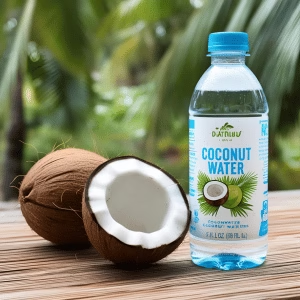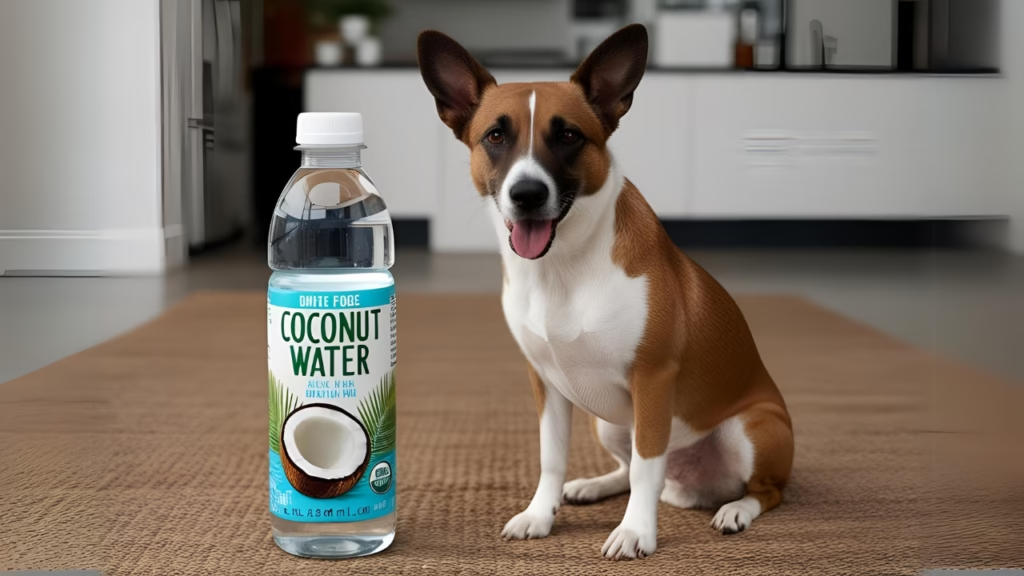Have you ever been enjoying a refreshing glass of coconut water on a hot day and noticed your furry friend giving you those irresistible puppy eyes? It’s natural to wonder if your canine companion can safely share in this tropical treat. As pet parents, we’re always looking for ways to enhance our dogs’ diets and keep them healthy and hydrated. But before you pour some coconut water into your pup’s bowl, it’s essential to understand the potential benefits and risks.
In this comprehensive guide, we’ll explore everything you need to know about dogs and coconut water, from its nutritional profile to safe serving suggestions. Let’s dive in and discover whether this popular beverage is a good choice for your four-legged friend.
Understanding Coconut Water and Its Nutritional Profile
What Exactly Is Coconut Water?
Coconut water is the clear liquid found inside young, green coconuts. Unlike coconut milk, which is made by blending the flesh of mature coconuts with water, coconut water is naturally occurring and has a light, refreshing taste.
It’s become increasingly popular among health-conscious humans for its hydrating properties and nutrient content.
When you crack open a young coconut, the water inside is sterile and rich in electrolytes, making it nature’s version of a sports drink. But does that mean it’s appropriate for your canine companion? Let’s look closer at what’s inside this tropical beverage.
Nutritional Components of Coconut Water
Coconut water contains several nutrients that can be beneficial in the right amounts. It’s rich in potassium, magnesium, calcium, and vitamin C.
It also contains small amounts of sodium, manganese, iron, and zinc. These minerals play essential roles in maintaining proper bodily functions in both humans and dogs.
However, it’s important to note that coconut water also contains natural sugars and a high concentration of potassium.
While these components aren’t inherently harmful, they can pose risks when consumed in large quantities, especially for dogs with certain health conditions.
Can Dogs Safely Drink Coconut Water?
The Short Answer
Yes, dogs can drink coconut water, but with some important caveats. Natural, unsweetened coconut water isn’t toxic to dogs and can be offered as an occasional treat. However, it should never replace regular water as your dog’s primary source of hydration.
Think of coconut water as a special treat rather than a dietary staple. Just as you wouldn’t let your child eat ice cream for every meal, coconut water should be an occasional indulgence for your pup, not a regular part of their diet.
Moderation Is Key
When it comes to coconut water for dogs, moderation is absolutely crucial. A few laps or a small amount mixed with their regular water is plenty. For small dogs, a couple of tablespoons occasionally is sufficient, while larger breeds might handle up to a quarter cup.
Remember that your dog’s regular diet should already provide all the nutrients they need. Coconut water should be viewed as a supplement or treat, not a necessity for their health.
Potential Benefits of Coconut Water for Dogs
Hydration Properties
One of the most significant potential benefits of coconut water for dogs is its hydrating properties. After a vigorous play session or on a hot summer day, a small amount of coconut water can help replenish lost fluids and electrolytes.
The natural electrolytes in coconut water, including potassium, sodium, and magnesium, can help maintain proper fluid balance in your dog’s body. This makes it potentially useful for active dogs or those recovering from mild dehydration.
Nutritional Advantages
 Coconut water contains several vitamins and minerals that can contribute to your dog’s overall health. The potassium in coconut water supports muscle function and helps maintain fluid balance. Magnesium is essential for muscle and nerve function, while calcium contributes to bone health.
Coconut water contains several vitamins and minerals that can contribute to your dog’s overall health. The potassium in coconut water supports muscle function and helps maintain fluid balance. Magnesium is essential for muscle and nerve function, while calcium contributes to bone health.
Additionally, coconut water contains vitamin C, which can support your dog’s immune system. While dogs can produce vitamin C naturally (unlike humans), additional amounts during times of stress or illness might be beneficial.
Antioxidant Properties
The antioxidants present in coconut water can help eliminate free radicals from your dog’s body. This may support your dog’s immune system and help maintain healthy skin.
These antioxidant properties might be particularly beneficial for older dogs or those with inflammatory conditions, though it’s important to note that coconut water alone isn’t a treatment for any medical condition.
Risks and Concerns of Giving Coconut Water to Dogs
Hyperkalemia Risk
Perhaps the most significant concern with coconut water for dogs is its high potassium content. Excessive potassium can lead to hyperkalemia, a condition characterized by elevated potassium levels in the blood.
Hyperkalemia can affect your dog’s heart function and lead to symptoms like gastrointestinal problems, collapse, lethargy, and weakness.
Dogs with kidney issues are particularly susceptible to this condition, as healthy kidneys are responsible for regulating potassium levels in the body.
Sugar Content Concerns
While coconut water is lower in sugar than many fruit juices and sports drinks, it still contains natural sugars that can contribute to weight gain if consumed regularly.
With over 50% of U.S. dogs being overweight or obese, it’s essential to monitor all sources of sugar in your dog’s diet.
For dogs with diabetes or other conditions that require careful sugar management, even the natural sugars in coconut water can be problematic. Always consult with your veterinarian before offering coconut water to a dog with any metabolic condition.
Diuretic Effects
Interestingly, despite being promoted as a hydrating beverage, coconut water can actually have diuretic properties in dogs. This means it might increase urine production, potentially leading to more frequent bathroom breaks and, in extreme cases, dehydration.
This diuretic effect can disrupt your dog’s electrolyte balance, which is crucial for brain and organ function. If you notice your dog urinating more frequently after consuming coconut water, it’s best to discontinue use and stick with regular water.
Allergic Reactions
Just like humans, dogs can develop allergies to various foods, including coconut products. While not common, some dogs might experience allergic reactions to coconut water.
Signs of an allergic reaction can include hives, red or inflamed skin, vomiting, diarrhea, and in severe cases, difficulty breathing. If you notice any of these symptoms after giving your dog coconut water, discontinue use immediately and consult your veterinarian.
How to Safely Introduce Coconut Water to Your Dog
Starting Small
If you’ve decided to offer coconut water to your dog, start with a very small amount to see how they react. A teaspoon for small dogs or a tablespoon for larger breeds is sufficient for the first try.
Monitor your dog closely for any adverse reactions over the next 24 hours. If they tolerate it well, you can gradually increase the amount, but always keep it within moderate limits.
What to Watch For
After introducing coconut water, watch for signs of digestive upset, increased urination, or allergic reactions. Some dogs might experience loose stools or vomiting if they consume too much coconut water too quickly.
Also, be mindful of any changes in energy levels, appetite, or water consumption. If your dog seems unusually lethargic or refuses their regular food or water after having coconut water, consult your veterinarian.
Coconut Water vs. Coconut Milk for Dogs
It’s important to distinguish between coconut water and coconut milk when considering what to offer your dog. While both come from coconuts, they have different nutritional profiles and potential effects.
Coconut milk is made from the grated flesh of mature coconuts and contains significantly more fat than coconut water. While small amounts of coconut milk aren’t toxic to dogs, its high fat content can lead to pancreatitis or obesity if consumed regularly.
Coconut water, on the other hand, is naturally low in fat but high in potassium and natural sugars. Both should be offered only in moderation, with coconut water generally being the safer choice for occasional treats.
Signs Your Dog May Have Had Too Much Coconut Water
Knowing the signs of coconut water over-consumption can help you respond quickly if your dog has had too much. Watch for symptoms like:
- Lethargy or weakness
- Vomiting or diarrhea
- Excessive urination
- Decreased appetite
- Unusual thirst
- Bloating or discomfort
- In severe cases, collapse or seizures
If you notice any of these symptoms after your dog has consumed coconut water, contact your veterinarian immediately. Prompt medical attention can prevent more serious complications, especially if hyperkalemia is developing.
Alternatives to Coconut Water for Dogs
If you’re looking for healthy, hydrating treats for your dog, there are several alternatives to coconut water that might be more suitable:
Fresh, clean water remains the best source of hydration for dogs. Consider adding ice cubes to their water bowl on hot days for a refreshing treat.
Bone broth (without onions or garlic) can be a nutritious and hydrating addition to your dog’s diet. It’s lower in potassium than coconut water and offers beneficial proteins.
Small amounts of diluted apple juice (no added sugar) can be an occasional sweet treat with fewer concerns about potassium content.
Specially formulated dog-safe electrolyte solutions are available if your vet recommends electrolyte supplementation for your pet.
Remember that any treat, including these alternatives, should make up no more than 10% of your dog’s daily caloric intake.
Conclusion
So, can dogs drink coconut water? The answer is yes, but with caution and moderation. While coconut water offers some potential benefits like hydration and nutrients, its high potassium content and natural sugars pose risks that shouldn’t be overlooked.
For most healthy dogs, small amounts of natural, unsweetened coconut water as an occasional treat shouldn’t cause problems. However, dogs with kidney issues, diabetes, or other health concerns should probably avoid it altogether.
Always consult with your veterinarian before introducing any new food or drink to your dog’s diet, especially if they have existing health conditions. Your vet can provide personalized advice based on your dog’s specific needs and health status.
Remember that your dog’s primary source of hydration should always be fresh, clean water. While it’s natural to want to share your favorite treats with your furry friend, sometimes the simplest option is the healthiest one.
Frequently Asked Questions
1. How much coconut water can I safely give my dog?
The safe amount depends on your dog’s size, health status, and individual tolerance. As a general guideline, small dogs (under 20 pounds) should have no more than 1-2 tablespoons occasionally, medium dogs (20-50 pounds) might handle up to 1/4 cup, and large dogs (over 50 pounds) could potentially have up to 1/3 cup. However, start with much smaller amounts when first introducing it and always monitor for adverse reactions.
2. Can puppies drink coconut water?
It’s best to avoid giving coconut water to puppies under one year of age. Puppies have developing digestive and urinary systems that are more sensitive to electrolyte imbalances. Stick to fresh water and properly formulated puppy food for young dogs.
3. Is flavored or sweetened coconut water safe for dogs?
No, only plain, unsweetened coconut water should ever be considered for dogs. Flavored varieties often contain added sugars, artificial sweeteners (some of which, like xylitol, are toxic to dogs), or other ingredients that could be harmful. Always check the ingredient list carefully.
4. Can coconut water help my dog with dehydration after exercise?
While coconut water does contain electrolytes that can help with rehydration, plain water is still the best choice for most dogs after exercise. For severe dehydration, always consult your veterinarian rather than attempting home treatment with coconut water or other remedies.
5. Are there any breeds that should absolutely avoid coconut water?
While no specific breed is universally unable to tolerate coconut water, breeds predisposed to kidney issues (such as Shih Tzus, Lhasa Apsos, and Basenjis) or diabetes (like Samoyeds, Australian Terriers, and Schnauzers) should be given coconut water with extra caution, if at all. Always consult with your veterinarian about breed-specific dietary considerations.



